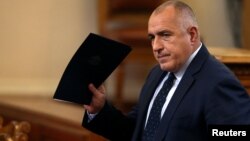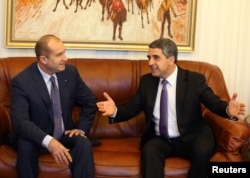Bulgaria's parliament approved on Wednesday the resignation of Prime Minister Boiko Borisov's center-right minority government, opening the way to months of political uncertainty and a likely snap election in early 2017.
Borisov had tied his government's fate to the outcome of Bulgaria's presidential election and he quit after the victory, in Sunday's second round of voting, of political novice Rumen Radev, who favors improved ties with Russia and had the backing of the opposition Socialists.
“The country is now facing several months of political turmoil with a caretaker government that will not undertake major policy reforms in the meantime,” said Andrius Tursa of Teneo Intelligence.
“The results of the presidential elections on Sunday made it clear that society wants a change,” Borisov told parliament. “The vote requires a change in the political situation.”
Corruption major concern
Borisov's move underscores politicians' failure to persuade voters they are serious about fighting rampant corruption after the prime minister's GERB party beat the Socialists in 2014 on a tough anti-graft ticket.
Many Bulgarians also appear increasingly disappointed with their political elite as well as with the European Union, which is struggling to deal with various challenges including the migrant crisis and Britain's decision to leave the bloc. All parties in parliament backed the government's resignation.
If, as expected, no party accepts the mandate to attempt to form a new government out of the current legislature, outgoing President Rosen Plevneliev will begin consultations to appoint an interim administration to steer Bulgaria towards an early parliamentary election, most likely in the spring.
Radev a former air force commander
Plevneliev, a center-right former minister in a Borisov-led government, has said he will also consult with his successor, Radev, in any talks on forming an interim government.
Radev, a former air force commander who says Bulgaria must revive strained ties with Russia while remaining anchored in NATO and the European Union, will become president in January.
Analysts say Bulgaria's political turmoil could prove prolonged as another parliamentary election seems unlikely to produce a stable majority government able to implement the economic and other reforms the country needs.
Bulgaria, a Black Sea nation of 7.2 million, joined the EU in 2007 but still depends almost entirely on Russia for its energy supplies and military kit, while Russian tourists are an important source of revenue.






